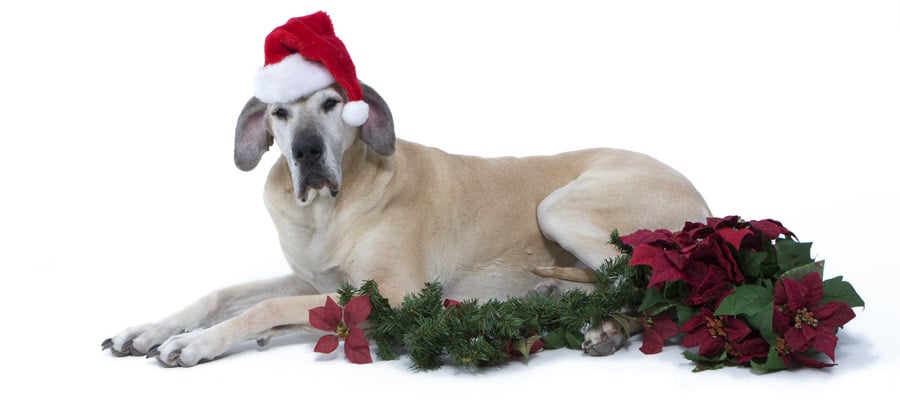You may or may not have heard that poinsettias are highly toxic, even deadly to pets and children. If this is news to you, you maybe worried about bringing these popular plants into your home during the holidays since it's "common knowledge" that they could be fatal when ingested.
Don't fret.
Truth be told, poinsettias are not highly poisonous. Although they're certainly not edible and could cause a host of complications if eaten by your pets, they're not the highly toxic killers they've been made out to be. This is one myth that just won't die and has become a part of traditional lore in a way that overly frightens people away. Here are the simple facts about poinsettias and how you can enjoy them while keeping your pets safe.
Poinsettias and Your Dog
Poinsettia poisoning does occur in dogs when they've ingested all or a large part of a poinsettia plant. Let's be clear: your dog would likely have to devour almost your entire plant to be in any danger. Also take into account your dog's weight. Small dogs obviously would only have to eat half the plant.
The reason that poinsettias are toxic to dogs is that they contain chemicals and saponins that can cause a reaction in your dog.
About Poinsettias
Poinsettias are native to Central America and Mexico, so you most likely won't find them while hiking the foothills of Boise this year. However, when the holidays roll around, these brightly colored flowers are everywhere as a sign of good cheer and celebration. Their red flowers are iconic and attractive.
These plants are easy to spot but go by many different names. Here are the varieties and names of the poinsettia plant.
- Euphorbia
- Easter flower
- Mexican flame leaf
- Pastora
- Christmas flower
- Painted leaf
- Flor de Pascua
- Lobster flower plant
- Fleur Pentecote
- Etoile de Noel
Signs of Poinsettia Poisoning
The poinsettia plant's toxicity level is known to be mild or moderate, meaning that fatality is highly unlikely. If your dog ingests poinsettias, the severity of his or her symptoms will be related to how much was consumed and your dog's weight and relative health.
Look out for these symptoms if you believe your dog has eaten a poinsettia plant:
- Excessive drooling
- Licking lips repeatedly
- Irritation, particularly around the nose, skin, face, and lips
- Red, itchy, watering eyes
- Pawing at eyes and face
- Diarrhea
- Vomiting
If your dog is experiencing these symptoms, it could be because the milky saponins and chemicals in the poinsettia plant's leaves and stems are irritating her face and digestive tract. Phorbol esters and the altering of enzymes and protein functions from poinsettia may be the culprit behind your dog's strange behavior.
What You Should Do
If you believe that your dog has ingested poinsettia, it's worthwhile to call your vet and ask about the symptoms you're seeing and discuss your concerns. Most likely, your dog will be able to pass the plant and handle the toxicity on his own, but it's better to be safe than sorry.
If your dog hasn't already emptied the contents of her stomach onto your carpet, your vet will likely induce vomiting to decontaminate her. Blood work and urinalysis will help shed like on organ function, as well as a biochemistry profile. Your dog may receive fluids and activated charcoal, and your vet will know whether additional monitoring is necessary.
The good news: the prognosis is likely good if your dog ingested poinsettia. To be on the safe side, keep all household plants, cleaners, human food, and chemicals out of reach and away from your dog.
Check out our ebook When Plants and Pets Don't Mix to find out what other plants to keep away from your pets.

